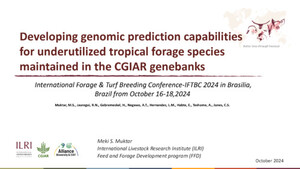
Elephant grass supplementation in the feed of fattening pigs affects growth performance, carcass characteristics, blood profiles and intestinal microorganisms
Abstract
To investigate the effects of the dietary inclusion of elephant grass on the growth performance, blood profiles, carcass characteristics, ileum and stomach microbiota of fattening pigs, pigs were fed one of seven diets including a basal diet (Control), and six treatments, where the basal diet was supplemented with 10%, 15% or 20% of elephant grass, Cenchrus purpureus cv. Guiminyin (CpGui10, CpGui15, CpGui20) or cv. Purple (CpP10, CpP15, CpP20). Results showed that supplementation of 20% CpGui in the diet significantly increased (P < 0.05) average daily gain (ADG) and gain to feed (G/F) ratio by the end of the experiment. Additionally, pigs fed the CpGui20 diet showed higher (0.01 < P < 0.05) slaughter weight and tended to have increased loin-eye area and lean meat percentage, and, decreased backfat thickness compared with control pigs. Furthermore, 16S ribosomal DNA gene amplicon profiling showed that the inclusion of elephant grass in the diet was associated with modulation of the ileum and stomach microbiota composition at the order level. Relative abundance of the Lactobacillales order in the ileum and stomach increased with different proportions of elephant grass, while that of Enterobacteriales decreased. In conclusion, these results indicate that at up to 20% inclusion in the diet of pigs, elephant grass can promote enhanced growth performance and carcass characteristics, and, modulate the ileum and stomach microbiota composition of the pigs.
Citation
Gao, L., Yan, Q., Li, J., Pang, T., Lu, L., Yi, X., Jones, C.S. and Zhang, J. 2022. Elephant grass supplementation in the feed of fattening pigs affects growth performance, carcass characteristics, blood profiles and intestinal microorganisms. Frontiers in Animal Science 3:911692.









